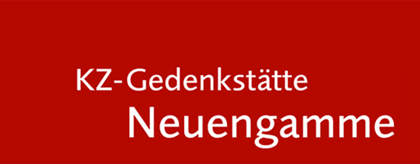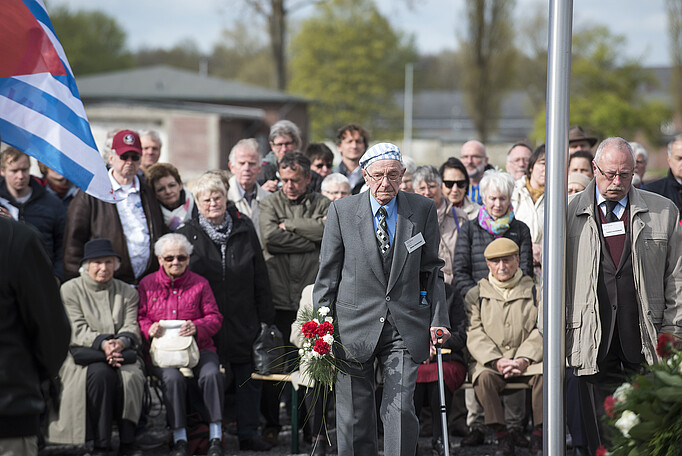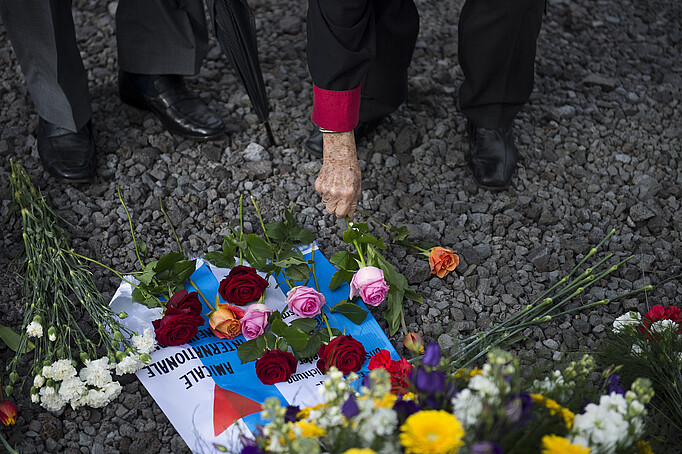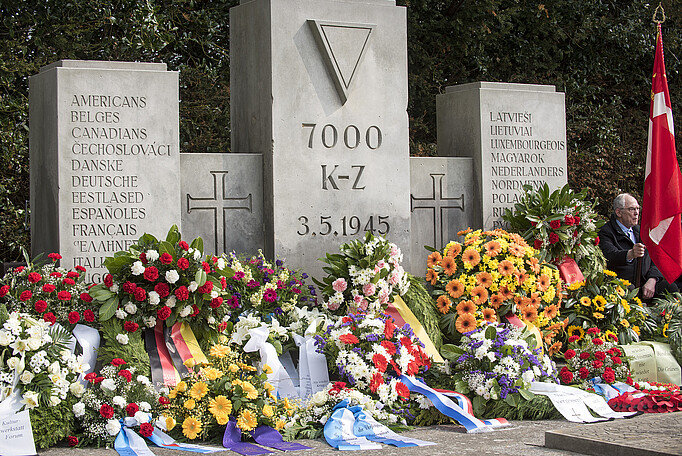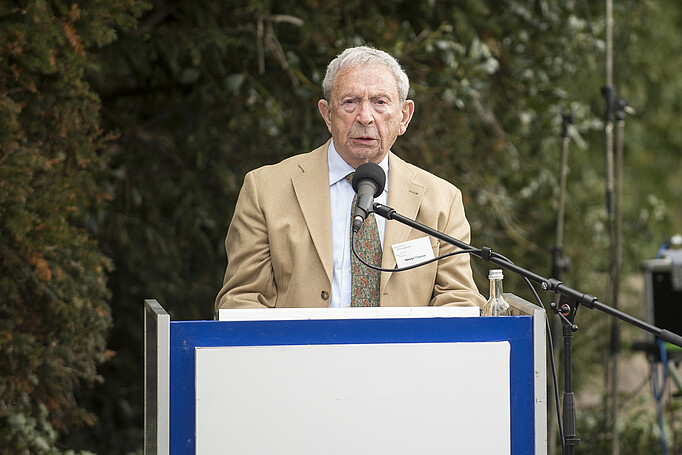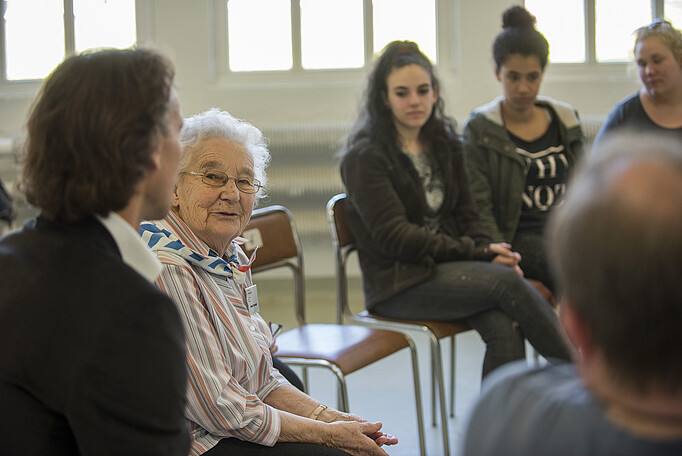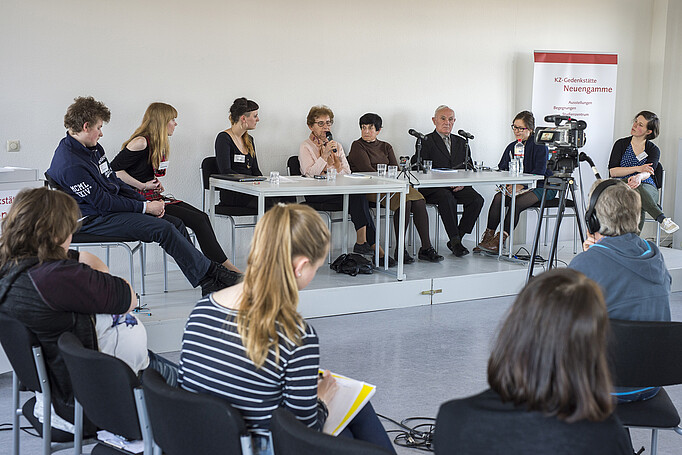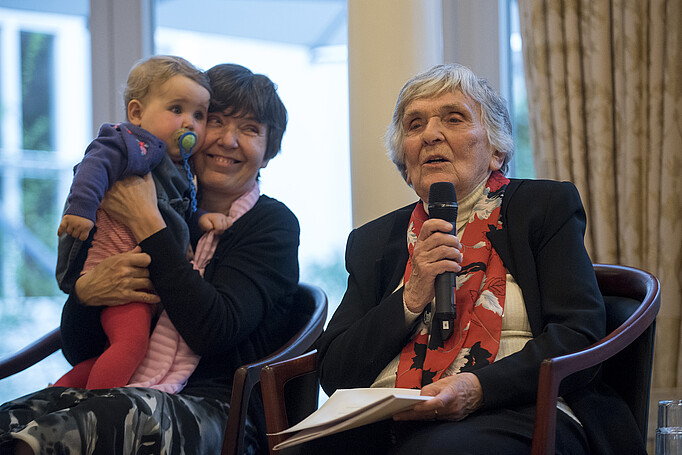05/06/2016 Commemorative ceremony
Memorial Service Commemorating the 71st Anniversary of the End of the War and the Liberation of the Concentration Camp
The memorial services at the Neuengamme Concentration Camp Memorial and the Cap Arcona Memorial in Neustadt, the forum “Future of Remembrance” and other events in this year’s commemoration programme
This year's commemoration programme began with the couple Martine Letterie and Ringe Smedinga reading "Ein Krieg von zwei Seiten. Zwei Personen, zwei Perspektiven" (One War from Two Sides. Two People, Two Perspectives) in the GOLEM bar on the 29th of April 2016. Martine is the granddaughter of the Dutch communist Martinus Letterie, who was murdered at the Neuengamme concentration camp, while Ringe's father voluntarily joined the SS and was a guard at the Westerbork transit camp. In their reading performance, they explored their families' history and how this has affected their lives. The bar was packed, with 65 guests who came to hear them read.
The second event was the "Zukunft der Erinnerung" (Future of Remembrance) forum, which took place from 30 April - 2 May 2016. Sixty descendants of former concentration camp prisoners, members of survivor organisations, employees of the Neuengamme Concentration Camp Memorial and its associated organisations, as well as youths and other interested individuals came together to discuss the future of remembering the Nazi era. They talked about networking, integrating survivor organisations more in the work done at memorials, and how to present the names of all former prisoners at the memorial grounds. Forum participants also discussed how descendants of former perpetrators and victims deal with their family history, and whether this should be made available to the public. In this context, seven young adults presented a stop-motion film that they had made prior to the forum about how they deal with their own family history. This was followed by three survivors of the Neuengamme concentration camp who answered young adults' questions about their life stories.
On the 30th of April, the special exhibition "Zwischen Harz und Heide. Todesmärsche und Räumungstransporte im April 1945" (Between the Harz Mountains and the Heath. Death Marches and Evacuations in April 1945) opened with 100 guests in attendance. Dr Dagmar Lieblová, a Neuengamme camp survivor; Dr Regine [M1] Heubaum, the vice director of the Dora-Mittelbau Concentration Camp Memorial; and Dr Jens-Christian Wagner (Stiftung Niedersächsische Gedenkstätten / Foundation of Memorials in Lower Saxony) talked about the theme of the exhibition. The opening was accompanied by a performance by the clarinet player Nele B. Nelle.
On the mornings of the 2nd and 4th of May, talks were held with survivors of the Neuengamme concentration camp and its satellite camps. Livia Fränkel (Sweden), Henryk Francuz (Israel), Joanna Fryczkowska (Poland), Janusz Kahl (Poland), Roman Kamieniecki (Poland), Ivan Moscovich (Netherlands), Karla Raveh (Israel) and Natalija Radchenko (Belarus) discussed their imprisonment and their lives after survival with pupils and other interested listeners.
Also on the 2nd of May, 180 guests gathered in the Gartensaal of the Hotel Basler Hof in downtown Hamburg to listen to a podium of four generations. The Czech concentration camp survivor Eva Keulemansová, her children Peter Smolka and Eva Tesarová, and her granddaughter Lenka Attelová, who also brought her 10-month old daughter Anna, talked about their personal experiences in a cross-generational discussion that was organised by the Neuengamme Concentration Camp Memorial and the Friedrich Ebert Foundation concerning how survivors often talk very little about their past with their families. Eva Keulemansová talked to Ulrike Jensen from the Neuengamme Concentration Camp Memorial about her life as a prisoner, while her children and granddaughter Lenka talked about to what extent and how their mother/grandmother's imprisonment has been or is discussed in the family. Despite the uncomfortable subject, the tone of the conversation was calm and relaxed.
On the 3rd of May, a memorial service commemorating the 71st anniversary of the bombing of the prisoner ships in the Neustadt Bay was attended by 250 people, including many survivors and their families. Henryk Francuz (Israel) and Jewgenij Malychin (Ukraine), both former concentration camp prisoners and survivors of the catastrophe, held speeches at the monument in Neustadt in Holstein. They were joined by Jean-Michel Gaussot, the president of the Amicale Internationale KZ Neuengamme (AIN); Sönke Sela, the head of the Neustadt city council; and Dan Howard, the British military attaché. The Arbeitsgemeinschaft Neuengamme (Working Group Neuengamme) also read a text out loud and school pupils released air balloons.
In the afternoon of the same day, Hamburg's main memorial service commemorating the 71st anniversary of the end of the war and the liberation of the concentration camp was held at the Neuengamme Concentration Camp Memorial. The service began by laying wreaths in front of the camp's former detention bunker (Arrestbunker). After this, Dr Dorothee Stapelfeldt, the Senator for Urban Development and Housing of the Free and Hanseatic City of Hamburg; Roman Kamieniecki, a Polish survivor of the Neuengamme concentration camp; and Dr Martine Letterie, vice-president of the AIN and granddaughter of a Dutch prisoner of Neuengamme concentration camp, all held speeches for the memorial service attended by roughly 250 guests in the former Walther factory. The service ended with the presentation of a film made by participants of a stop-motion film project that is about how they personally deal with their family history and its ties to the Nazi past. The Neue Chor (New Choir) accompanied the service. Two events held on the 4th of May concluded the memorial service programme for 2016. The first event took place at 5 pm and was a memorial service commemorating the Neuengamme satellite camp Wandsbek-Drägerwerke. This service was attended by the Belarusian camp survivor Natalija Radchenko and also featured a reading from the new and revised edition of the book Ein KZ in Wandsbek (A Concentration Camp in Wandsbek) by Stefan Romey. Then at 8pm, the German historian Nikolaus Wachsmann read from his book KL. Die Geschichte der nationalsozialistischen Konzentrationslager (original title: KL: A History of the Nazi Concentration Camps) at the University of Hamburg. Following the reading, the author talked with Alexander Solloch, literature editor at NDR Kultur. This event was organised by the Neuengamme Concentration Camp Memorial in cooperation with the radio broadcaster NDR Kultur and the University of Hamburg.
